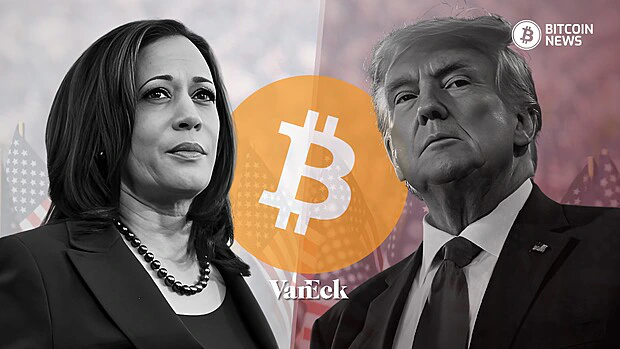As the 2024 U.S. Presidential election draws nearer, the impact of candidates Trump and Harris on the Bitcoin world has become a hot topic.
While former President Donald Trump has positioned himself as a “crypto-friendly” candidate, some experts believe that a Kamala Harris presidency might actually be more beneficial for Bitcoin specifically.
According to a report by VanEck, an asset management firm, both candidates could have significant but different impacts on the future of Bitcoin and the broader digital asset industry.
Donald Trump, who once called Bitcoin a “scam,” has undergone a change of heart. He has embraced Bitcoin and even used it in a high-profile transaction at a New York City bar, declaring, “It’s the beginning of a new era.”
Trump has promoted himself as a supporter of the entire digital asset ecosystem, from Bitcoin to NFTs (Non-Fungible Tokens).
His campaign rhetoric has been favorable to deregulation and pro-business policies that many believe could provide a much-needed boost to the Bitcoin industry.
According to VanEck analysts, Trump’s policies could be very beneficial for digital asset entrepreneurs and businesses that have faced increasing regulatory scrutiny over the past few years.
Trump has also promised to fire current SEC Chair Gary Gensler, who has been criticized for his tough stance on digital asset regulations.
Vice President Kamala Harris, on the other hand, has been quieter about her stance on digital assets, leading some to believe that her administration might not be as favorable to the industry as Trump’s.
However, VanEck’s analysts, Matthew Sigel and Nathan Frankovitz, argue otherwise. They believe that Harris could actually be better for Bitcoin, even though her policies might introduce stricter regulations for the broader digital asset market. Matthew Sigel wrote:
“We think that while Kamala Harris and Donald Trump are bullish for Bitcoin, each presents more nuanced implications […] Both administrations will likely maintain fiscal spending if not further accelerate, which could lead to further quantitative easing — especially if exacerbated by anti-business policies.”
He added, “I do think it is possible that an unfriendly Democrat White House could inadvertently help BTC.”
The analysts argue that a Kamala Harris presidency could be more favorable for Bitcoin specifically than a second Trump term. They believe her administration might accelerate economic challenges like inflation and currency devaluation, which would drive more people toward Bitcoin as a hedge.
Bitcoin’s established regulatory clarity could also make it more competitive compared to other digital assets under such conditions.
In fact, Harris’s potential continuation of the current economic policies could weaken the U.S. dollar further, which would likely fuel Bitcoin’s adoption. VanEck noted that “Bitcoin can serve as a vital hedge” as inflation and currency instability continue to plague fiat monetary systems.
Related: Unmasking Inflation | The Reality of a Debased Currency
One major difference between the two candidates lies in their likely approach to regulations.
VanEck predicts that a Harris administration might retain Gary Gensler as SEC Chair and align with figures like Senator Elizabeth Warren, who has been critical of the industry. This could lead to stricter regulations that might dampen institutional adoption of altcoins.
However, this isn’t necessarily bad news for Bitcoin. According to VanEck, Bitcoin could thrive under Harris’s stricter regulatory framework because it already has clearer legal guidelines compared to other digital assets.
The analysts wrote that Harris’s presidency would accelerate many of the structural problems that are driving Bitcoin adoption and give Bitcoin a competitive advantage over other digital assets that may face more regulatory hurdles.
“Both Harris and Trump are bullish on Bitcoin,” VanEck wrote, pointing out that either presidency could result in a weaker dollar, which could push more people toward Bitcoin.
While VanEck believes Harris could be better for Bitcoin specifically, Trump is seen as more favorable for the broader digital asset ecosystem. His pro-business stance and promises of deregulation could open doors for other digital assets and related businesses.
In contrast, Harris might introduce stricter regulations, which could stifle growth in the broader digital asset market. However, Bitcoin, with its clearer regulatory framework, would likely remain strong.
According to VanEck, Bitcoin could gain an even larger share of the digital asset market if other digital assets face stricter regulations.
Alongside the political developments, VanEck has observed growing institutional interest in Bitcoin. Trading volumes for bitcoin have surged by 173%, and U.S. dollar-denominated bitcoin transfers have increased by 202%.
This suggests that regardless of who wins the 2024 election, institutional support for Bitcoin is on the rise.
In addition, several countries like Kenya, Ethiopia, and Argentina have started mining bitcoin, further increasing sovereign and institutional engagement with the digital currency.
Geoff Kendrick, an analyst at Standard Chartered investment bank, has indicated that bitcoin is likely to reach new all-time highs by the end of the year, regardless of the outcome of the US election.
He believes that “positive drivers dominating regardless of the election outcome,” could potentially push bitcoin to record levels by the end of 2024. Kendrick added:
“I think Bitcoin ends the year higher, at new all-time highs, no matter who wins the U.S. election, with a Trump win taking it to $125,000 and $75,000 if it’s Harris.”










